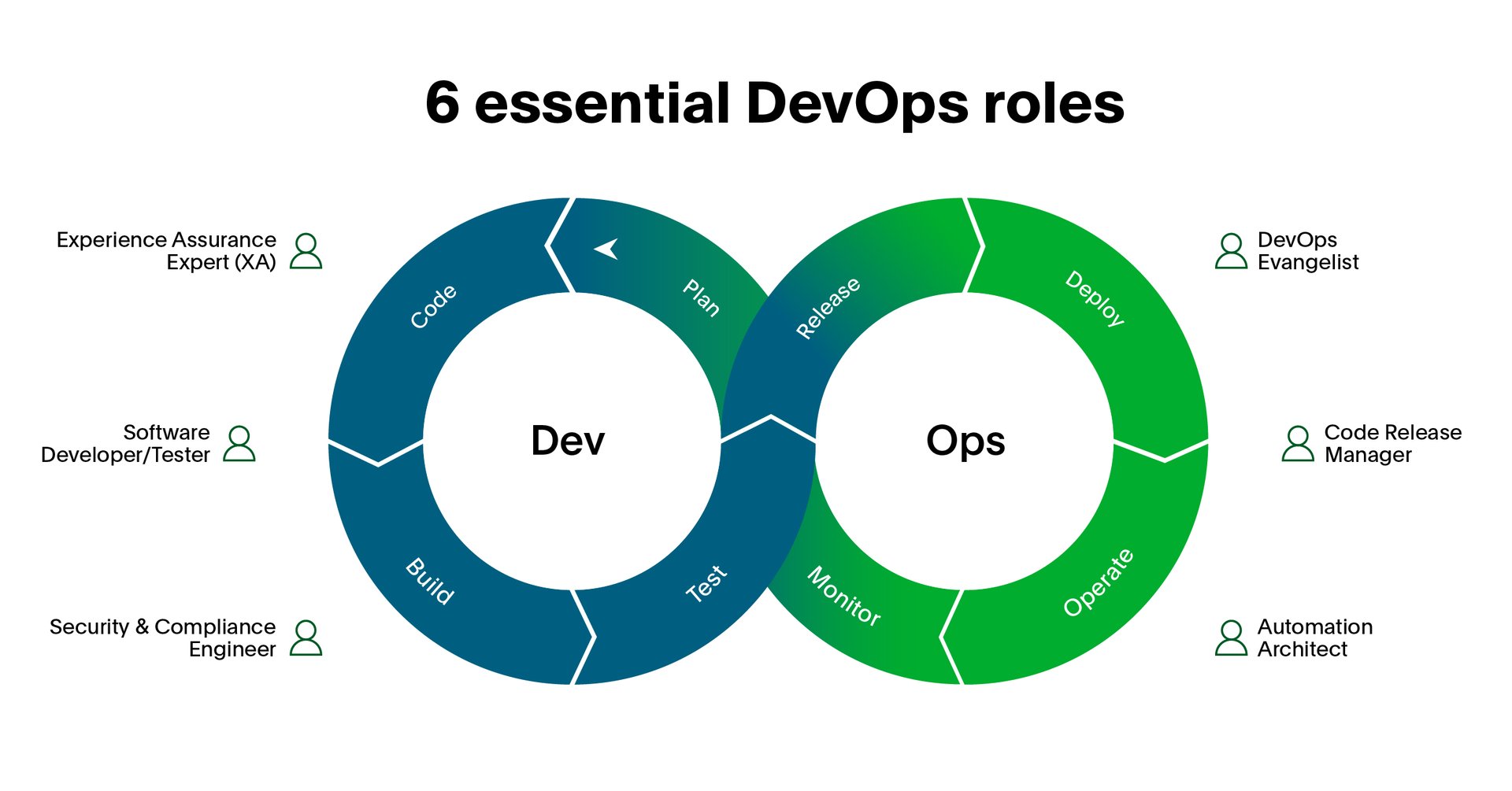6 Essential DevOps Roles You Need on Your Team
DevOps is a tech philosophy and culture that aims to improve collaboration between the software development and IT operations teams. Before DevOps, development and operations often worked in very siloed environments. Developers would traditionally write their code, pass it over to operations, then move onto their next task. This process left operations teams carrying most of the responsibility over the code with little guidance from development once it’s been handed off. Not only did this mean lengthy backlogs and slower time to market, but it also did little to help build a trusting and collaborative relationship between development and operations.

DevOps aimed to change this—both for the benefit of the team as well as the customer. A streamlined, more collaborative workflow meant a happier and more efficient team, which ultimately leads to higher quality products and faster time-to-market.. The increased collaboration between developers and operations meant less time spent on escalations, and fewer issues to fix down the road. This meant more time could be spent on improving and innovating current products.
Now, more and more companies are making the push towards DevOps. Tech giants like Amazon, Netflix, and Etsy all use DevOps to ensure high-quality products and optimal usability. With DevOps, tech teams of all sizes are seeing dramatic increases in productivity and are finding themselves able to push out higher quality products faster than ever before.
If you’re interested in implementing DevOps, here are 6 essential DevOps roles that you’ll need on your team.
-
The DevOps Evangelist
The DevOps Evangelist is the change agent responsible for owning and delivering change toward a DevOps culture. The DevOps Evangelist is responsible for ensuring the success and implementation of all DevOps processes and team identity.
DevOps Evangelist main duties consist of:
- Promote the benefits of DevOps
- Ensure buy-in from both development and operations teams
- Determine the key roles
- Ensure all team members are trained
-
The Code Release Manager
The Code Release Manager typically holds the Project Manager role in a DevOps model. Additionally, the Code Release Manager must also have the technical knowledge and expertise to run and maintain the process of product and application development and delivery. A DevOps Code Release manager must also understand how and when to leverage agile methodologies.
Code Release Manager Main Duties:
- Project manage products and applications from development through deployment
- Track the progress of DevOps using impact and other key metrics
-
The Automation Architect
The Automation Architect is essential to a DevOps team because DevOps is all about automating systems. It’s the Automation Architect’s responsibility to create processes that use automation to help reduce manual tasks. They are responsible for creating a more efficient process and finding the right tools to use and integrate within a DevOps model.
Automation Architect Main Duties:
- Design and implement strategies for automating manual tasks
- Find the right DevOps tools for different processes
-
The Experience Assurance Expert (XA)
The Experience Assurance Expert is along the lines of quality assurance, but it is largely tied to the customer experience and its simplicity in terms of use. The Experience Assurance Expert, or XA, is the person responsible for creating a smooth user experience of the final product. Think of the XA as an advocate for the customer. They are making sure the end product not only works correctly and has the right features, but also that it’s easy to use.
XA Main Duties:
- Verify all features outlined in the original specifications are in the final product
- Ensure a smooth and enjoyable user experience across the product and all features
-
The Software Developer/Tester
The Software Developer is the product builder. They are the ones responsible for writing the code, and in a DevOps setting, the developer also performs unit testing and deployment, as well as ongoing monitoring. This is a bit more of an expanded role compared to the traditional developer, which was mostly concerned with just writing code.
Software Developer/Tester Main Duties:
- Write the code for new products, features, security updates, and bug fixes
- Ensure all lines of code are up to original business requirements
- Perform unit testing
- Perform deployments
- Monitor product performance
-
The Security & Compliance Engineer
The Security and Compliance Engineer (SCE) is the person responsible for the overall security of the system. In DevOps, the SCE works right alongside development and is able to integrate their security recommendations while the product is being built rather than during post-production.They work closely with all departments and roles to ensure the company is being safe with its data and is in compliance with the necessary requirements.
SCE Main Duties:
- Ensure products are in compliance with all established standards and regulations
- Work alongside development to ensure product is safe and secure against possible attacks
How These Roles Work Together
In a DevOps setting, these six roles work cohesively to create a collaborative and efficient environment with shared accountability of each product through development, deployment, and monitoring. A DevOps team build can help to greatly improve the quality of products and applications while also getting them to market faster. This leads to positive customer outcomes and a more collaborative software development and delivery process
.
If you are working towards implementing a DevOps model, the most important step is to get the buy-in from your development and operations teams. Once you get that buy-in, you can start building the model that best suits your organizations needs. Want to learn more about how PagerDuty can help your teams move to DevOps? Try a 14-day PagerDuty trialtoday.

Additional
Resources

EBook
Achieve Operational Resilience in the Cloud with PagerDuty and AWS

EBook
What is Runbook Automation?